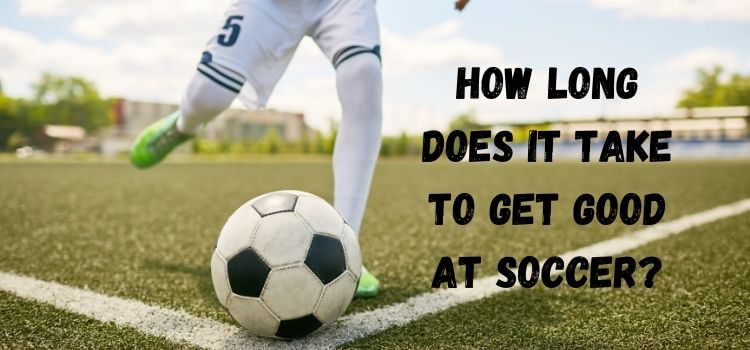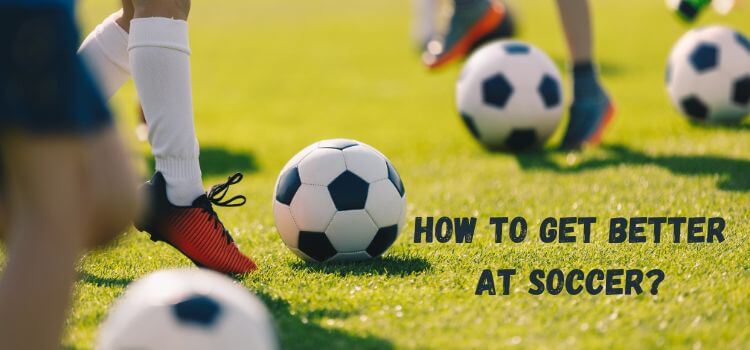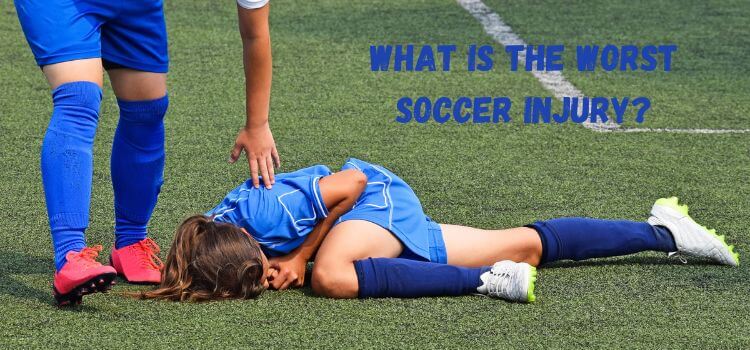As an Amazon Associate, I earn from qualifying purchases
So, you’ve caught the soccer bug and wondered, “How long does it take to get good at soccer?” Well, you’re not alone! Many aspiring players grapple with this question. Understanding the timeline for Improvement can help set realistic expectations and motivate you.

The Basics of Getting Started
Let’s talk about getting started before diving into how long it takes to get good. Your first steps in learning soccer should include:
- Understanding the rules of the game
- Familiarize yourself with essential equipment like soccer cleats and shin guards.
- Learning fundamental skills like dribbling, passing, and shooting.
Factors Influencing the Learning Curve
Natural Talent and Physical Fitness
Everyone has a unique starting point. Natural athleticism can give some players an edge, but don’t worry if you feel behind. Consistent effort often trumps raw talent.
Age and Starting Point
The age at which you start playing soccer can influence how quickly you improve. Children learn new skills more quickly because their bodies and brains are still developing. However, there is always time to start! Many adult beginners find joy and success in soccer.
Quality of Coaching and Training
Having access to good coaching can significantly speed up your progress. A knowledgeable coach can provide valuable feedback, correct mistakes, and help you develop a strategic understanding of the game.
Frequency and Consistency of Practice
Like any skill, practice is critical. Practicing regularly (at least a few times weekly) will yield better results than sporadic sessions. Consistency helps reinforce muscle memory and build endurance.
Setting Realistic Goals
Short-term Goals
Set achievable short-term goals, such as mastering a specific skill or improving stamina. These milestones will keep you motivated.
Long-term Goals
Think about where you want to be in a year or two. Whether making a school team or joining a local league, having long-term goals gives you something to strive for.
Skill Development Stages
Beginner Stage
At this stage, focus on learning the basics and having fun. You’ll be developing fundamental skills and starting to understand the game’s flow.
Intermediate Stage
You’ll refine your basic skills and learn more advanced techniques and strategies here. Consistent practice and playing in games are crucial.
Advanced Stage
In the advanced stage, players focus on perfecting their skills, understanding advanced tactics, and maintaining peak physical fitness. This stage often involves specialized training and playing at competitive levels.
The Role of Physical Fitness
Importance of Conditioning
Soccer is a physically demanding sport. Good conditioning helps improve your performance and reduces the risk of injury.
Specific Exercises for Soccer Players
Include exercises that build endurance, strength, and agility. Running, sprinting, and plyometric exercises are all beneficial.
Technical Skills to Master
Dribbling
Control the ball with both feet, keeping it close to navigate through defenders.
Passing
Work on accuracy and timing to effectively move the ball to teammates.
Shooting
Focus on technique and power to improve your goal-scoring abilities.
Defending
Learn positioning and tackling techniques to stop opponents.
Tactical Understanding
Basic Tactics and Formations
Understand different formations and their purposes. Learn how to adapt to various game situations.
Reading the Game
Develop the ability to anticipate opponents’ moves and make quick decisions.
Mental Aspects of Soccer
Building Confidence
Confidence grows with practice and experience. Celebrate small victories to boost your self-belief.
Handling Pressure
Discover methods to maintain composure under pressure, such as visualization exercises and deep breathing.
The Importance of Team Play
Developing Teamwork Skills
Soccer is a team sport. Practice communicating with teammates and understanding your role within the team.
Communication on the Field
Your team’s performance can be significantly affected by effective communication. Coordinate with teammates by using both spoken and nonverbal cues.
Training Regimen
Designing an Effective Training Schedule
Balance your training to include skill work, fitness, and rest. Overtraining can lead to burnout and injuries.
Balancing Skill Work, Fitness, and Rest
Be careful to provide enough time in your schedule for relaxation and healing. This balance helps sustain Improvement and avoids injuries.
Common Challenges and How to Overcome Them
Dealing with Plateaus
It’s normal to hit a plateau. Change up your training routine or focus on different skills to break through.
Recovering from Injuries
Follow a proper rehabilitation program, and don’t rush your return to play. Listen to your body and take the necessary time to heal.
The Role of Competition
Importance of Playing Matches
Matches are where you apply what you’ve learned in practice. They provide real-world experience and help you improve under pressure.
Learning from Real Game Experiences
Analyze your performance after each game. Identify areas for Improvement and work on them in practice.
Tracking Progress
Methods to Evaluate Improvement
Maintain a training log to monitor your development. Record your goals, practice sessions, and game performances.
Adjusting Training Based on Progress
Review your progress regularly and modify your training schedule as necessary. Flexibility helps you stay on track toward your goals.
Conclusion
Getting good at soccer is a journey that depends on various factors, including natural talent, quality of training, and dedication. You can steadily improve and enjoy the beautiful game by setting realistic goals, practicing consistently, and maintaining a balanced training regimen. Remember, the key is to enjoy the process and celebrate every milestone.
FAQs
It typically takes 10-15 years of dedicated practice and training to reach a professional level. However, based on unique conditions, this can vary greatly.
While a coach can significantly speed up your progress, self-taught players can also become skilled through consistent practice, studying the game, and playing regularly.
Diet is crucial for maintaining energy levels, aiding recovery, and overall performance. A well-balanced diet is essential, including the proper proportions of fats, proteins, and carbs.
Starting young, around 5-7 years old, can be advantageous due to the rapid learning capabilities of children. However, many players start later and still achieve high levels of skill.
Setting clear goals, celebrating small victories, and surrounding yourself with supportive teammates and coaches can help maintain motivation. Kindly keep in mind that you should enjoy yourself and the game.
Read Our More Articles
- How to Get Great at Soccer: Strategies for Success
- Can I Play Soccer After Getting a Tattoo? A Comprehensive Guide
- How Do You Get Scouted for Soccer? A Comprehensive Overview
As an Amazon Associate, I earn from qualifying purchases


